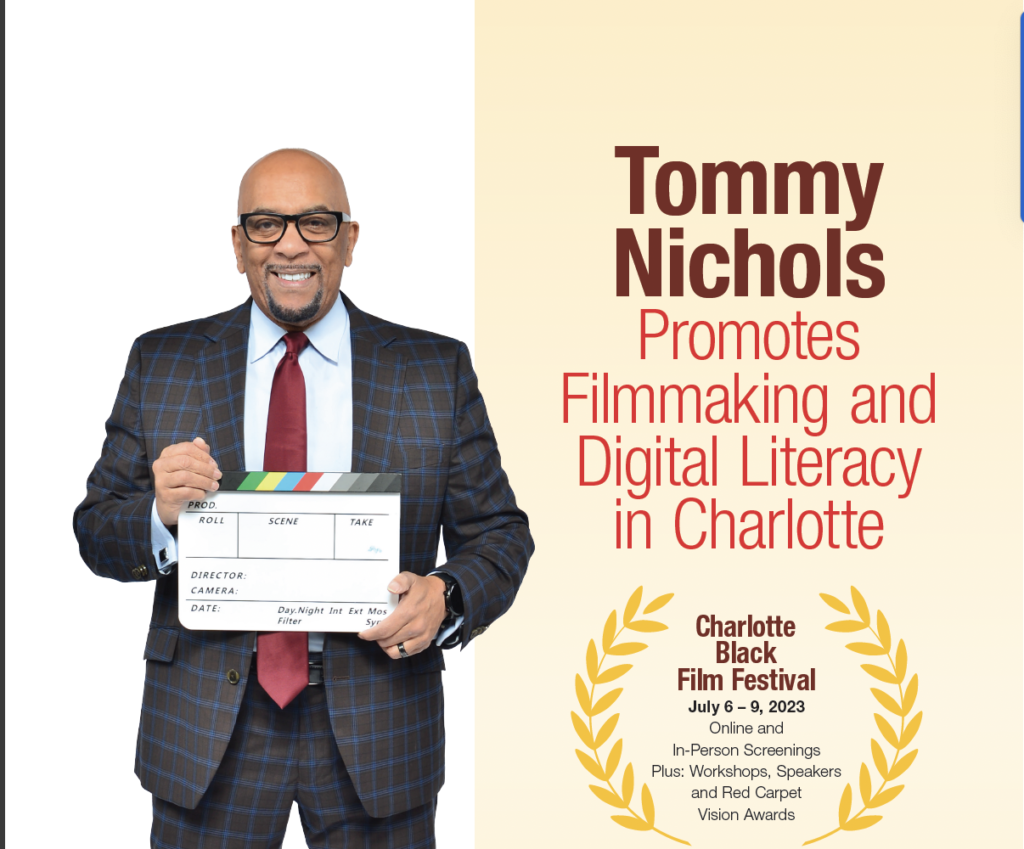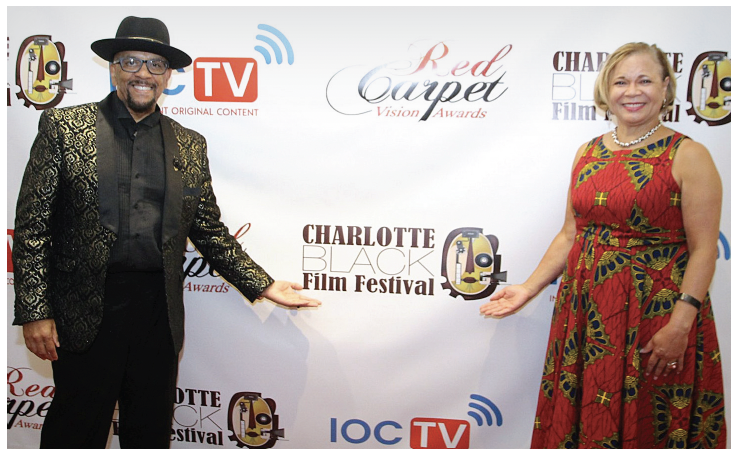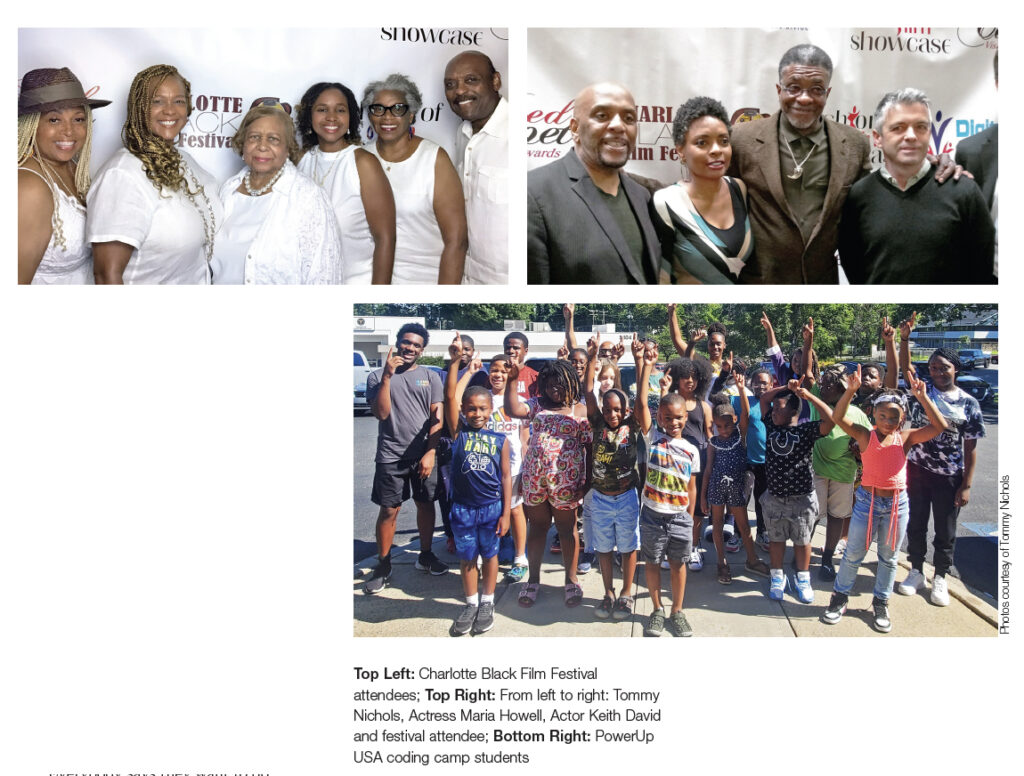By Brenda Porter-Rockwell
The founder of the Charlotte Black Film Festival, Tommy Nichols, is not only passionate about the films, he’s also on a mission to advance job creation in Charlotte using digital technology education and training in film production. Nichols says he’s dedicated to “creating empowering platforms for dope people to do amazing things.”
See a problem, find a solution
Nichols is proud of how far the CBFF has progressed in more than 20 years of showcasing independent films from Black creators. He fondly recounts the many testimonials people have shared with him and the scrappy little films that have gone on to see worldwide success.
But Nichols didn’t wake up one day and decide to start a film festival — this endeavor was much more intentional.
He started the first Black-owned technology training firm in Dayton, Ohio. In 2009, he moved to the Queen City to work in film and technology. Once settled in the area, he realized the Black community was woefully underserved when it came to film production and training; so in 2010, he created the Charlotte Black Film Festival.
This year’s four-day film festival, scheduled for July 6 – 9, will be a hybrid event including 35 films that will be screened in person and 65 to be streamed online. There will also be workshops, speakers and the annual Red Carpet Vision Awards, where the best films will be recognized.
Nichols said his goal is to use the film platform to bridge the digital divide between Charlotte’s haves and have nots and use the festival as a driver of workforce development for up-and-coming minority filmmakers. These days he gets about 400 submissions from Charlotte’s independent Black filmmakers. He screens each entry and narrows the submissions to the top 100 to showcase.
Our mission is to provide a platform for emerging and established Black filmmakers to showcase their work, inspire and educate audiences, and promote diversity and inclusion in the film industry,” explained Nichols.
The festival includes full-length and short films, documentaries, animations and experimental films that all explore different themes and experiences that reflect the richness and complexity of the African American community.
“I say, ‘How can we make this film thing equal and give [Blacks] their fair share?’” said Nichols. “The Charlotte Black Film Festival is the first platform dedicated to African American content creators, producers, actors and writers. It gives the local artist access to industry training, new content direction and industry expert advice that doesn’t exist in Charlotte.”
The festival expands economic development in the film industry, but also adds value in the tourism and hospitality industries, he said.
Evolution of a film festival

The festival has grown organically over the years, and Nichols said he likes to keep things interesting.
“We do things that others don’t — like our PitchMe Competition, Actors Idol, Fashion of Film Showcase and Red Carpet Vision Awards. And last year we added the Comedy of Film showcase,” said Nichols, adding that the festival has been consistent, even during the covid pandemic.
Some of the hottest entries this year include: “Remember Me: The Mahalia Jackson Story,” “African Redemption: The Life & Legacy of Marcus Garvey,” “Bigger Than Africa” and “Black Coffee.”
While many festival organizers seek to outperform the year before with bigger and better acts, Nichols has turned his attention inward to grow the event.
“Adding more creative elements, funding opportunities and industry connection to the festival is key for its growth and sustainability,” Nichols said.
First, the CBFF website received a major overhaul after Nichols created IOCtv.net.
“Instead of paying $9,000 to $10,000 for another platform to screen our films, I created my own IOCtv.net, which stands for Independent Original Content,” Nichols said.
In 2022, IOCTV received grant funding from the John S. and James L. Knight Foundation’s Art + Tech Expansion Fund to update CBFF’s website security protocols. Nichols also used some of the funding to create a mobile app, Reel Inclusion, which will increase the impact and reach of the festival, he said. Nichols also plans to hold quarterly screenings, ultimately giving local filmmakers more opportunities to be seen by the big studios.
“Everybody says they want to do inclusion, so — we’re trying not to give [the studios] an excuse. There will be diversity and inclusion,” he said.
The CBFF rules require the lead actor, writer, or director to be from the African diaspora. However, the festival also has representation from the Latino, Asian, white and LGBTQ+ communities. Last year, the festival included a filmmaker from the deaf community for the first time.
Giving back
For Nichols, being a “digital apostle” means teaching and acting in a God-like manner.
“I’m a man of prayer. Most of us don’t tap into heaven. [Inspiration] comes down to me from tapping into heaven that I pull down to here,” said Nichols pointing to his mentorship program, the Carolina Black Film Collective, where filmmakers collaborate on employment opportunities, grants, production and workforce development training.
Local filmmakers Peter and Pam McNeil credit Nichols’ guidance when talking about their first feature film, “Urge,” which is now streaming on Amazon Prime. After attending their first CBFF in 2016, the McNeils would go on to volunteer at CBFF festivals and attend meetups with the collective.
“We continue to view Tommy as a mentor. He’s very passionate about seeing others succeed and possesses a wealth of knowledge,” said Peter McNeil.
Nichols is also the creator and executive director of PowerUp USA, an organization that works to empower Charlotte citizens with skills and training around digital literacy, technology, and digital filmmaking to help bridge the digital divide.

In addition to his work locally, the National Endowment for the Arts hired Nichols for a second year to review proposals and recommend media arts grants totaling almost $4 million for artistic projects nationwide. “This organization is discretely using media in the web in a very, very unique way to tell stories,” he said.
With all the work he has on his plate, Nichols said he’s accepted that the cause requires a lot of late nights and sacrifice. But in the end, it’s a story worth telling.
Sidebar





